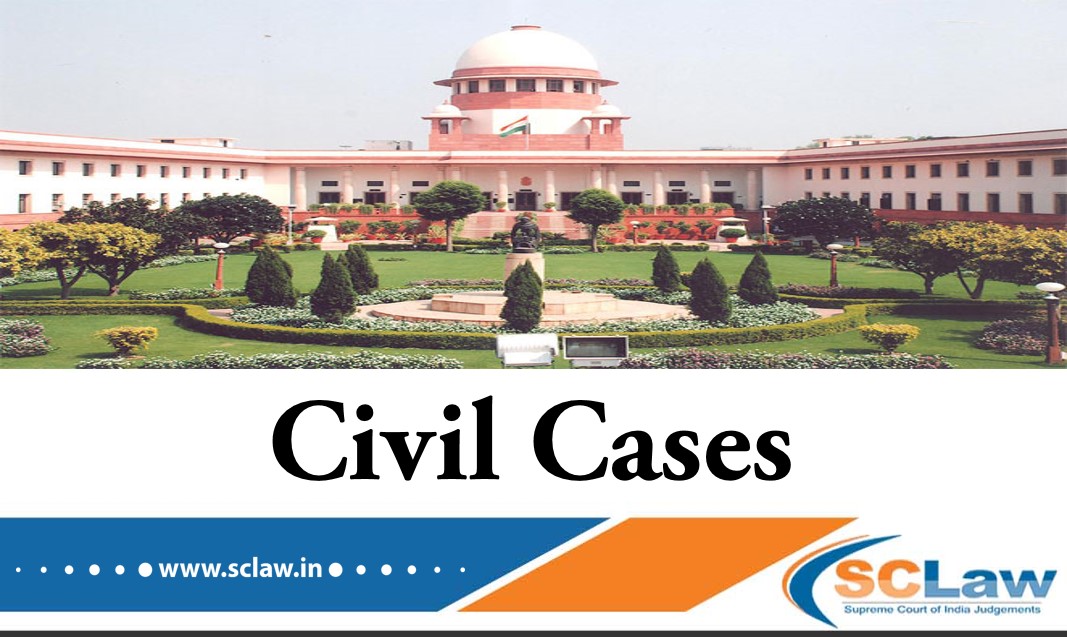Normally, retrial has to be ordered by appellate court under S.386 Cr.P.C—However, in exceptional circumstance, such a power can be exercised by the High Court under Art. 226 or by Supreme Court under Art. 32 (ii) Such a power can be exercised even before the pronouncement of the judgment by the Trial Court.
(2018) 1 AICLR 240 : (2017) AIR(SCW) 5690 : (2017) AIR(SC) 5690 : (2017) 3 AllCrlRulings 3409 : (2017) AllSCR(Crl) 1928 : (2017) 4 BomCR(Cri) 661 : (2018) CriLJ…
Landlord & Tenant–Eviction–Parting with Possession-Appellant took shop for running ration shop in 1964-He entered into partnership in 1977 and parted with possession without consent of landlord- Eviction upheld on ground of parting with possession without the consent of landlord without adjudicating about the genuineness of the partnership agreement.
(2017) 179 AIC 245 : (2017) AIR(SCW) 3353 : (2017) AIR(SC) 3353 : (2017) AllSCR 1621 : (2017) 125 ALR 186 : (2017) 3 ARC 15 : (2017) 3…
Specific Relief Act, 1963, S.20–Specific Performance-Agreement to Sell—Once the Trial Court, first and second Appellant Court formed an opinion and decided to grant the specific performance of the agreement to the plaintiff in exercise of their respective discretionary powers, Supreme Court being the last court in hierarchy cannot disturb such concurrent findings while exercising power under Article 136 of the Constitution of India—Such concurrent findings are binding on Supreme Court.
(2018) 181 AIC 255 : (2017) AIR(SCW) 3601 : (2017) 4 AIRJharR 415 : (2017) AIR(SC) 3601 : (2017) AllSCR 1855 : (2017) 5 ALT 29 : (2017) 5…
Letter Patent Appeal—An ‘interlocutory order’ determining the rights of the parties in one way or other is also a ‘judgment’—Letter Patent Appeal against such interlocutory orders is maintainable. Impleadment of Assignee—Assignee of interest in suit can continue with suit only by leave of court.
(2018) AllSCR 1 : (2018) 1 ICC 685 : (2018) 1 JBCJ 65 : (2018) 1 JCR 182 : (2017) 4 JLJR 238 : (2017) 4 LawHerald(SC) 2778 : (2017) 4 PLJR 281 :…
Revenue Law—Jurisdiction of Civil Court—Once agricultural land loses its basic character and has been converted into authorized/unauthorized colonies, the bar on jurisdiction of civil courts would not be attracted.
(2017) AIR(SCW) 5852 : (2017) AIR(SC) 5852 : (2018) AllSCR 145 : (2017) 245 DLT 355 : (2017) 12 JT 272 : (2018) 1 LawHerald 177 : (2018) 1 LawHerald(SC) 1 :…
Land Acquisition—Market Value—It is neither permissible and nor proper to rely solely upon the rates of small plots and then determine the compensation for a large chunk of acquired land.
(2018) 181 AIC 171 : (2017) AIR(SCW) 5811 : (2017) AIR(SC) 5811 : (2018) 126 ALR 490 : (2018) 1 ApexCourtJudgments(SC) 60 : (2018) 1 JCR 204 : (2017) 4LawHerald(SC) 2755 : (2018)…
Auction Sale—Validity of Mortgage—Question of validity of mortgage cannot be raised for first time in appeal before High Court.
(2018) 181 AIC 63 : (2017) AllSCR 2389 : (2018) 126 ALR 551 : (2017) 3 ARC 786 : (2017) 6 BCR 854 : (2018) 1 ICC 683 :…
Service Law—Joining Back—Deputation to Foreign Country-Appellants while in service went on foreign service without taking requisite permission—When they came back and submitted joining report but were not issued joining orders—Since no departmental inquiry or action was taken for not taking permission; period spent in foreign country is to be treated as ‘unauthorised absence’
(2017) AIR(SCW) 5569 : (2017) AIR(SC) 5569 : (2017) AllSCR 2385 : (2018) 1 CLR 403 : (2018) 156 FLR 401 : (2017) 4 JLJR 384 : (2017) 10 JT…
Transfer of Property Act, 1881, S.58(c)–Redemption of Mortgage-Mortgage by conditional sale—Determination of nature of document—Held–must contain recitals of loan transaction and creation of a debtor and creditor relationship for creating it as mortgage by conditional sale.
(2017) AIR(SCW) 5046 : (2017) AIR(SC) 5046 : (2018) AllSCR 7 : (2018) 1 AndhLD 38 : (2017) 4 BLJud 197 : (2018) 125 CutLT 225 : (2017) DNJ 1048…
Rajasthan Public Trust Act, 1959, S.29—Unregistered Trust—Bar is created for hearing and deciding a suit and not filing the suit—
(2017) 177 AIC 231 : (2017) AIR(SCW) 3603 : (2017) 4 AIRJharR 417 : (2017) AIR(SC) 3603 : (2017) AllSCR 1885 : (2017) 124 ALR 567 : (2017) 3 ARC…












